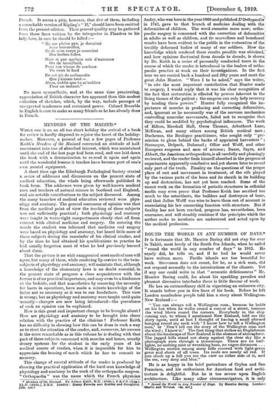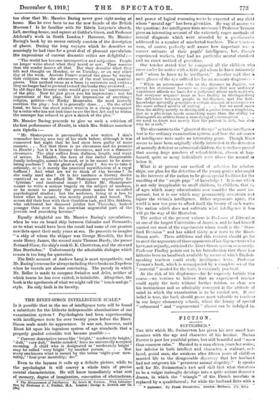ROUND THE WORLD IN ANY NUMBER OF DAYS.* IT is
fortunate that Mr. Maurice Baring did not stay for ever in Tahiti, most lovely of the South Sea Islands, when he sailed " round the world in any number of days " in 1913. He nearly did, he tells us, and if he had he would never have written more. Pacific) islands are too beautiful for
work. Stevenson does not count, for he, as a sick man, did not respond normally to the intoxications of the climate. Yet if any one could write in that " aromatic deliciousness " Mr.
Maurice Baring could, for about his sparkling parodies and pleasant discursive interludes there is little flavour of work.
He has an extraordinary skill in vignetting an unknown city. It stands before you in five lines of his book. Before he left London numberless people told him a story about Wellington, New Zealand :—
" You can always tell a Wellington man, because he holds on his hat when he walks round a corner of a street, because the wind blows round the corners. Everybody in the ship coming out, to whom I mentioned New Zealand, told me the story again, until at last I thought of having a small placard hanging round my neck with ` I know how to tell a Wellington man,' or ` Don't tell me the story of the Wellington man and the wind ; I know it.' The first thing that strikes an Englishman about the landscape of New Zealand is the absence of atmosphere. The jagged hills stand out sharp against the clear sky like a photograph seen through a stereoscope. There are no half- lights, no melting mist or wreathing haze, no vague distances. . . . Wellington nestles among steep hills covered with light-green grass and shorn of all trees. Its roofs are nearly all red. If you climb up a hill you see the view on either side of it, and the sea, very deep and blue."
He is as happy in his brief portraiture of Ceylon and San Francisco, and his enthusiasm for American food and archi-
tecture is delightful. But he is too severe upon English architecture. Like many other circumnavigators, it is only
• Round the World in Any Number of Days. By Maurice Baring. London: tauttto and Windom. tge. now
too clear that Mr. Maurice Baring never goes sight-seeing at home. Has he ever been to see the new facade of the British Museum ? Is he familiar with Sir Edwin Lutyens's church, hall, meeting-house, and square at Golder's Green, and Professor Adshead's work in South London ? However, Mr. Maurice Baring's book by no means entirely consists of the description of places. During the long voyages which he describes so amusingly he had time for a great deal of pleasant speculation. His impressions of current dramatic critics are delightful :—
" The world has become introspective and subjective. People no longer write about what they heard or saw. They assume that the reader knows all that. But they describe what they felt and thought on Monday, or on Tuesday, or on any other day of the week. Anatole France started the game by saying that criticism was the adventures of the soul among master- pieces. This method came as a boon to reviewers and critics ; they no longer had to pretend to read the books they reviewed... . In old days the literary critic would give you his impressions' of the play. Now he just gives you his impressions : not his impressions of the play, but his impressions of anything : religion, politics—the Rocky Mountains. He need scarcely mention the play : but it is generally done. . . . On the other hand, we have the short notice written in a cheap newspaper by a critic who has not had time to see the last Act and to whom the manager he,s refused to give a sketch of the plot."
Mr. Maurice Baring proceeds to give us such a criticism of the first performance of Hamlet, in which Mrs. Siddons somehow acts Ophelia :- " Mr. Shakespeare is presumably a new writer. I don't remember having seen any of his work before, although it was rumoured last night that he had once been guilty of some sonnets.. . . Not that there is no cleverness and no promise in Hamlet ; but it is a literary cleverness, and not a dramatic cleverness. The play suffers from dullness, length, and want of action. Is Hamlet, the hero of this rather disagreeable family imbroglio, meant to be mad, or is he meant to be simu- lating madness ? Is the ghost a real ghost ? Are we to take it seriously, or is it merely the practical mystification of a royal buffoon ? And what are we to think of the heroine ? Is she really mad also ? Or is her madness a literary device contrived so as to afford Mr. Shakespeare opportunity for ' lyricism' and incidental music ? Either Mr. Shakespeare meant to write a serious tragedy on the subject of madness, or he meant to parody the prevalent mania for so-called psychological studies ; but the audience, being at a loss to know what he meant, was merely puzzled and bored. The actors did their best with their thankless task, and Mrs. Siddons, who celebrated her diamond jubilee last Thursday, looked younger than ever in the somewhat ungrateful part of the peevish and provoking heroine."
Equally delightful are Mr. Maurice Baring's speculations, when he was on board ship between Colombo and Fremantle, as to what would have been the result had some of our greatest novelists spent their early years at sea. He proceeds to imagine " a ship of whom the skipper was George Meredith, the first mate Henry James, the second mate Thomas Hardy, the purser Bernard Shaw, the ship's cook G. K. Chesterton, and the steward Max Beerbohm." Unfortunately the admirable dialogue which ensues is too long for quotation.
The little account of Andrew Lang is most sympathetic, and Mr. Baring's reasons for always including three books on Napoleon when he travels are almost convincing. The parody in which Mr. Belloc is made to compare Swindon and Arles, neither of which towns he has ever visited, is inimitable. Altogether, the book is the apotheosis of what we might call the " touch-and-go " style. Its only fault is its brevity.















































 Previous page
Previous page